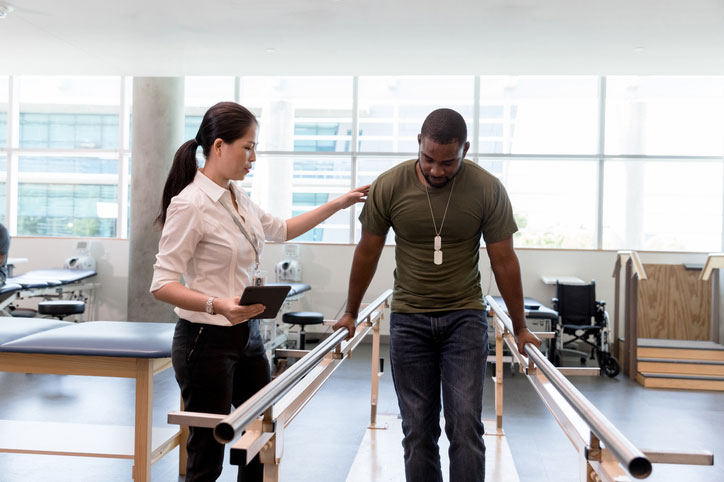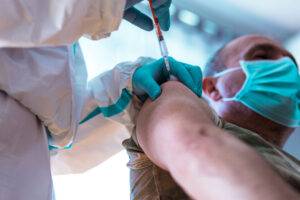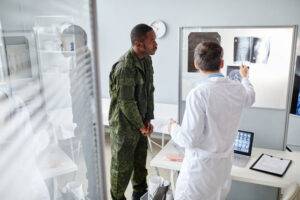
The appearance of U.S. Department of Defense (DoD) visual information does not imply or constitute DoD endorsement.
Allied health professionals are those specialists and technicians who take care of the important details in medical treatment that support the work that physicians and nurses do. There are dozens of roles in allied health, ranging from anesthesia technicians to perfusionists to surgical techs, as well as the more familiar ones, including audiologists, dental assistants, physical therapists, radiology technologists, and even message therapists.
According to the Department of Veteran’s Affairs, around 7 percent of all active duty military personnel are involved in healthcare work.
And most of them are represented among the ranks of the military medical corps.
 All these professions are booming as the American healthcare industry booms. In fact, according to the VA’s 2015 Veteran Economic Opportunity Report, health professions and related clinical sciences degrees are the third most popular type of program that veterans pursue after discharge.
All these professions are booming as the American healthcare industry booms. In fact, according to the VA’s 2015 Veteran Economic Opportunity Report, health professions and related clinical sciences degrees are the third most popular type of program that veterans pursue after discharge.
Those degrees are a big deal in allied health professions. Although there’s no single degree program that applies to all of them, in each field a drive for expertise and professionalism is making college a must-have on your resume. And your military experience and veterans’ benefits can help you get there.
Explore Your Military Training and Degree Options
The Military Has Been Driving Innovation in Allied Health for Decades
In fact, military medicine is responsible for the very existence of many of these jobs in the first place. The entire profession of sonography wouldn’t exist without the contributions of Doctor George Ludwig of the Naval Medical Research Institute, for example.
Ultrasonic scanning was introduced during the Second World War to detect invisible flaws in metals, including tank armor and ship hulls. After the war, the Naval Medical Research Institute started experimenting to see if it could also be used to detect structures and anomalies in tissue.
The demands of war routinely led to the development and widespread use of new medical technology over the years. The push to get wounded troops into surgery as quickly as possible, for example, led to new uses for sonography as a faster method of imaging internal structures with less equipment.
The Next Emerging Technologies in Healthcare Will Also Have Military Applications
 Big leaps in healthcare coming out of military needs aren’t just in the distant past, either. As the face of modern warfare changes, you can expect entirely new categories of allied health positions to emerge.
Big leaps in healthcare coming out of military needs aren’t just in the distant past, either. As the face of modern warfare changes, you can expect entirely new categories of allied health positions to emerge.
One that may be on the not-too-distant horizon: surgical robotics technician.
The far-flung deployment needs of the American military combined with increasing capabilities in communication and remote piloting have already created a phenomenon once relegated to sci-fi films: Armed drones circling over foreign battlefields operated by remote pilots.
In the next decade, you may also see surgical robotics hardware designed to operate on wounded personnel in forward bases controlled remotely by surgeons in U.S. hospitals.
But don’t forget the infrastructure it’s going to require to keep those drones up and running. Technicians with an understanding of medical needs, telecommunications, electromechanical systems, and sterilization procedures are going to have to be in place before any surgeon makes their first remote incision.
Like most military technologies, these systems too will find important roles in civilian healthcare. So keep your ear to the ground for new jobs in allied healthcare that may emerge while you are serving. You can get a jump on the field by specializing in something that doesn’t even exist in the civilian world yet.
In other cases, although they weren’t created by the military, some allied health jobs in the civilian world have been fueled by demand from veterans. The field of vocational and career counseling, for example, largely came out of society’s need to accommodate World War I veterans returning home from the horrors of the Western Front.
Today, these are thriving fields both in and outside the military. As a service member, you can use your training and benefits to advance along either civilian or military career paths in allied health.
How Military Healthcare Training Can Build Your Skills for a Career in Allied Health
 This overall interaction and crossover between military and civilian healthcare systems is a big plus for allied health workers going into the civilian world. Several branches of the American military staff a full complement of allied health professions within their own medical systems. But any kind of military service offers opportunities to build skills critical to success with an allied health degree:
This overall interaction and crossover between military and civilian healthcare systems is a big plus for allied health workers going into the civilian world. Several branches of the American military staff a full complement of allied health professions within their own medical systems. But any kind of military service offers opportunities to build skills critical to success with an allied health degree:
- Discipline
- Focus
- Adaptability
Still, if a career in an allied health field is your goal, then your best bet is to try to get a job in a military occupational specialty (MOS) as closely related to that civilian role as possible.
In many cases, the military has exactly the kind of coursework built in to your initial training to give you those skills. The classes they put you through might actually be accepted for college credits later on. Even if not, they give you valuable previews of the same kinds of things you will be learning in a degree program in the field.
The Army, Air Force and Navy Offer Your Best Chance for Training in Allied Health Roles
 The Space Force and Marine Corps farm their medical services out to the Air Force and the Navy, respectively. Truth be told, most Coast Guard allied health services are handled by civilian contractors, as well. So your best preparation for careers in these fields will almost always run through the Army, Navy, or Air Force.
The Space Force and Marine Corps farm their medical services out to the Air Force and the Navy, respectively. Truth be told, most Coast Guard allied health services are handled by civilian contractors, as well. So your best preparation for careers in these fields will almost always run through the Army, Navy, or Air Force.
Army Allied Health Specialty Positions
The Army has far and away the largest collection of different healthcare jobs of any service. These are scattered through 11 different branches in the Medical Corps, typically with MOS numbers in the 60s and 70s.
Some of these are restricted to officers, like the 65C Dietitian MOS, but there are many enlisted opportunities ranging from the 68H Optical Laboratory Specialist to the 68L Occupational Therapy Specialist. Training is highly specialized, with your 10 weeks of Basic followed by anything from multiple phases of 16-18 week training modules to dedicated 41 week courses of Advanced Individual Training.
Air Force Allied Health Specialty Positions
Air Force medical ratings fall into AFSC Career Group 4. They are as diverse as the 4A2 Biomedical Equipment specialist and the 4H0 Medical Laboratory specialist positions. Each come with their own specific military training program. Most are enlisted specialties, with Group 4 officer AFSCs mostly reserved for MD or nursing specialties.
Navy / Coast Guard Allied Health Specialty Positions
The Navy and Coast Guard lump all of their enlisted healthcare jobs into the single Hospital corpsman or Health Service Technician rating, respectively. Those cover jobs ranging from paramedics to nurse’s aids to pharmacy technicians. The Navy’s basic “A” school for all of these jobs consists of 14 weeks at Fort Sam Houston at the Joint Base San Antonio Medical Education and Training Campus. Coast Guard HSTs get five months at their “A” School in Petaluma More specialized training happens on the job or at formidable “C” schools as you advance in rank.
The Military College of Allied Health Sciences Offers Advanced Training for All Branches
 You might be surprised to learn that the military runs its own medical school: the Uniformed Services University of Health Sciences grants full medical degrees to students from all services and the Public Health Service.
You might be surprised to learn that the military runs its own medical school: the Uniformed Services University of Health Sciences grants full medical degrees to students from all services and the Public Health Service.
But another part of this school is aimed squarely at training for allied health specialists. The College of Allied Health Sciences was created in 2016 and operates training centers at a number of bases:
- United States Air Force School of Aerospace Medicine - Wright-Patterson Air Force Base
- Medical Education and Training Campus - Joint Base San Antonio
- U.S. Army Medical Center of Excellence - Fort Sam Houston
- Naval Medical Forces Support Command - Yorktown, San Diego, Groton
- Joint Special Operations Medical Training Center - Fort Bragg
They run advanced courses for Army, Navy, and Air Force allied healthcare specialists, including in hot areas such as:
- Preventive Medicine
- Nuclear Medicine
- Medical Laboratory Science
- Neurodiagnostics
Any of these programs would cost you thousands or tens of thousands of dollars at a civilian school. But the military is happy to send you to them for free if you enlist in the right specialty field.
The Difference Between Healthcare Roles for Officers vs. Enlisted Service Members
 It can be tough to predict what kinds of jobs the military thinks can only be done by officers, and which are open to enlisted ranks. For example, the Army has an enlisted MOS called Occupational Therapy Specialist, 68L, as well as a commissioned MOS 65A for Occupational Therapy (OT).
It can be tough to predict what kinds of jobs the military thinks can only be done by officers, and which are open to enlisted ranks. For example, the Army has an enlisted MOS called Occupational Therapy Specialist, 68L, as well as a commissioned MOS 65A for Occupational Therapy (OT).
A good rule of thumb is that any allied health MOS that requires you to have a bachelor’s degree or higher will be an officer’s job, while anything requiring less education will be found in the enlisted ranks.
If you decide you want to pursue a commissioned allied health position, the good news is that you can find a few programs that can help you earn the degree you need before joining up. ROTC, the Reserve Officers’ Training Corps, is the most common of these. Army, Navy, and Air Force ROTC can pay for up to four years of college in return for a service commitment. You can use those to earn bachelor’s degrees in allied health fields.
Officers also have more ongoing training opportunities while on active duty. For example, for those 65A OTs, there are programs that offer 18-month post-graduate clinical OT doctorates as well as shorter, more focused courses in specializations like neuromusculoskeletal evaluation or burn rehab.
It’s often the case that the military version of allied health positions takes on greater scope and responsibility than their civilian counterparts. Military service pushes you to be your best. That means you come out the other side with greater confidence and more skills than most civilian-trained allied health specialists.
Structural Factors in the American Healthcare System Affecting Allied Health Careers
 American healthcare has been going through some tough times recently. COVID-19 did a number on the whole system, straining parts of it almost to the breaking point. At the same time, other areas almost shut down, as elective procedures were cancelled and folks like dermatologists got sent to the bench for a year or two.
American healthcare has been going through some tough times recently. COVID-19 did a number on the whole system, straining parts of it almost to the breaking point. At the same time, other areas almost shut down, as elective procedures were cancelled and folks like dermatologists got sent to the bench for a year or two.
But the American healthcare system is resilient, and has bounced back and found its footing once again. That means the big structural factors impacting healthcare jobs are back in focus:
- An aging population requiring more care in their twilight years
- New advances in technology offering new treatment options
- Improved healthcare insurance coverage delivering more services to more people
Allied Health Salaries Are Tied to Specialization, Not Just Education Level
 Salary levels in allied health fields offer a solid living—sometimes better than just solid, depending on the field.
Salary levels in allied health fields offer a solid living—sometimes better than just solid, depending on the field.
Allied health is such a broad collection of different kinds of jobs that it’s impossible to list them all. But here are a few representative kinds of allied health jobs that the Bureau of Labor Statistics has provided the median salary level for:
- Audiologist - $78,950 (Doctoral degree)
- Clinical Laboratory Technician - $57,800 (Bachelor’s degree)
- Dietitians and Nutritionists - $61,650 (Bachelor’s degree)
- Medical Assistant - $37,190 (Associate degree preferred)
- Medical Sonographers and Cardiovascular Technologists and Technicians - $75,380 (Associate degree)
- Nuclear Medicine Technician - $78,760 (Associate degree)
- Optician - $37,750 (Associate degree preferred)
- Pharmacist - $128,570 (Doctoral degree)
- Pharmacy Technician - $36,740 (Associate degree preferred)
- Physical Therapist - $95,620 (Doctoral degree)
- Radiation Therapist - $82,790 (Associate degree)
- Speech-Language Pathologist - $79,060 (Master’s degree)
Of course, each of these different kinds of jobs requires different levels of education, with specialist degrees in many cases. Even those that don’t technically require a college degree usually do require some kind of formal specialized training program. But that’s exactly what you can find at the right military friendly college.
How To Find the Right Military Friendly College for Your Allied Health Degree
 Whatever your specialty in the service, you are going to need to take some steps after you are discharged to turn it into one of those lucrative civilian careers. And that almost always includes picking up a college degree.
Whatever your specialty in the service, you are going to need to take some steps after you are discharged to turn it into one of those lucrative civilian careers. And that almost always includes picking up a college degree.
Not only are there a dizzying array of different allied health professions to pick from, but there are also hundreds of different schools offering degrees for them. And deciding which ones to apply to is all on you—no officer or detailer is going to tell you where to go or what to study.
So you need to look for a few key things when picking the right program to build on your military allied health training. You should find them all at a military friendly university.
Recognizing GI Bill® Benefits Is the Biggest Factor in Defining Military Friendly Colleges That Offer Degrees in Allied Health
The biggest deal in finding a military friendly university is making sure it accepts your biggest veteran’s education benefit: the GI Bill®. For many veterans, this family of benefits can take care of practically all the major expenses of getting a college education:
- Full tuition and fee coverage
- Housing stipends
- Book and supply cost coverage
The Department of Veteran’s Affairs offers the GI Bill® Comparison Tool on their website to help you find and compare information about these schools. It will tell you which benefits you can use at the school, and what their value will be based on the location. It also offers plenty of other good information, such as the number of GI Bill® program participants already at the school and other veteran’s support initiatives offered, like:
- Credit for military service expereince
- Tuition and admission policies for vets
- On-campus support groups
Some of these schools also participate in the VA’s Yellow Ribbon program. That’s a big deal if you plan to attend a private or out-of-state school. Post-9/11 GI Bill® benefits have a cap on tuition payments limited to the maximum in-state public school tuition rates. You generally have to pay out-of-pocket for anything more than that.
But schools that offer Yellow Ribbon benefits offer to kick in a little money to help you cover that extra. The VA matches the contribution, and in many cases, you can find a program that is the perfect fit for you without having to pay more.
Your Military Allied Health Training Can Translate Directly to College Credit at Some Universities
Since allied health positions in the military usually include a lot of formal schooling while you are still on active duty, it may also be important to find a college that is willing to offer you credits for those studies. DANTES, the Defense Activity for NonTraditional Education Support, is a tool that you can use to support that search. DANTES will help you send official copies of your JST (Joint Services Transcript) to academic institutions.
DANTES also offers free access to CLEP, College-Level Examination Program. CLEP lets you take a series of tests in college subject areas which many schools will then accept as credits in those course areas.
Special Veterans’ STEM Benefits Offer Extra Support for Earning Allied Health Degrees
Many allied health degree programs fall into the field known as STEM—Science, Technology, Engineering, Math. These are all considered more challenging, more hardcore science and technology programs that sometimes take longer to complete and require more support than other college degrees.
The Forever GI Bill® has got you covered if your program falls into this category. There are two different options offered for STEM students that deliver additional benefits on top of the regular GI Bill® payments:
- The Edith Nourse Rogers STEM Scholarship - For clinical training programs or degrees in biology, healthcare, or science technologies that requires a bit longer in school than your GI Bill® benefits will cover, the Nourse Scholarship will tack on an additional 6 months of benefits at the same rates—up to $30,000 in additional tuition and stipends may be coming your way.
- VET TEC - Certain allied health degrees might be covered under VET TEC. This five-year pilot program applies separately from your GI Bill® benefits. It can be used in certain technology training programs offered by VA-approved providers. These are often certificate or other college-prep programs that can give you an edge once you start studying for your degree.
How To Pick the Right Degree to Advance Your Allied Health Career as a Veteran
Each allied health profession comes with different licensing or professional practice expectations. That means that they can have very different requirements for the level of degree that you need to earn to practice in the civilian world. Dental hygienists can get by with an associate degree; if you want to become an occupational therapist, you’re looking at a master’s at a minimum, and maybe even a doctorate.
Associate
Two-year degree programs that are about half and half professional studies and general education courses. They are accepted by some four-year colleges as transfer degrees that satisfy the first two years of a bachelor’s program… at a lower cost!
Bachelor’s
These four-year degrees are considered the standard for most professional positions in allied health or business. With a healthy course of subject-specific courses in your field plus a standard level of liberal arts training, they produce well-rounded, well-equipped graduates suited to entry-level jobs or prepared for advanced studies.
Master’s
Master’s programs in allied health fields may last anywhere from two to four years. They leave behind all the general education coursework in favor of a highly-focused, specialized course of study in your field of expertise. They qualify you for highly technical positions or management level roles in many organizations.
Doctoral
Doctoral studies take you to the peak of almost every allied health profession—although in some fields they are a required qualification for licensure. They may last from three to seven years and involve a high level of research and original thinking that develops your own ideas and expertise in the field.
There are also majors in allied health itself. These degree programs are mostly found at the bachelor’s and associate levels. They teach the kind of basic coursework that most allied health professions rely on, subjects like:
- Biology and microbiology
- Anatomy and physiology
- Chemistry and physics
- Cultural training
- Psychology
- Healthcare systems
A College Degree in an Allied Health Field Builds On Your Military Training
 Of course, there are some allied health roles that don’t require a college degree at all. A phlebotomist or pharmacy technician can get started in the field right after discharge, just based on the training you got in the service.
Of course, there are some allied health roles that don’t require a college degree at all. A phlebotomist or pharmacy technician can get started in the field right after discharge, just based on the training you got in the service.
But it’s a competitive world out there and you’ll find that the kind of general skills, knowledge, and discipline that make you stand out will almost always come with a college education.
And of course, that all comes together with the general education requirements in most college degrees. These standard liberal arts courses are what make a college degree the kind of broadly-accepted, multi-purpose qualification for professional jobs that it has become today.
That means coursework in subjects such as:
- Communications and English
- Social studies
- Art
- History
- Sciences
Even if these subjects aren’t really a part of your field of study, they make you a more well-rounded individual. Building on top of your military training and can-do attitude, they hone your critical-thinking and problem-solving skills in ways that employers will love. And that works to your benefit no matter what allied health field you decide to pursue, in or out of the service.
2021 US Bureau of Labor Statistics salary and employment figures for Healthcare Occupations reflect national data, not school-specific information. Conditions in your area may vary. Data accessed June 2022.





